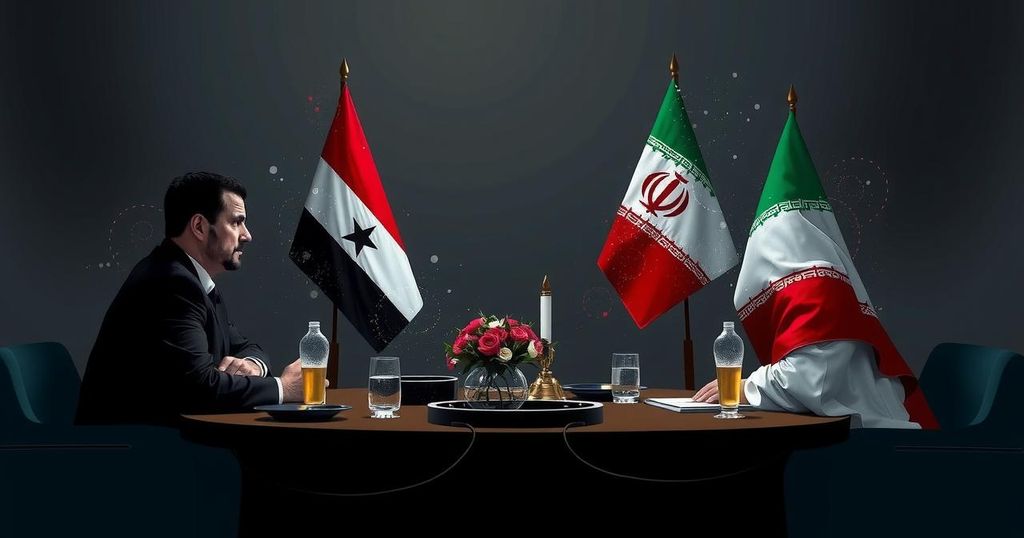The Syrian regime, facing opposition advances in northern Syria after losing Aleppo, is reaching out for support from Iraq, Iran, and the UAE. President Bashar al-Assad is seeking to stabilize his government amidst rising challenges and has emphasized cooperation in fighting terrorism and preserving Syria’s sovereignty in recent communications with these nations. This outreach underscores the shifting dynamics in regional alliances as Assad seeks to bolster his position.
The Syrian regime, facing significant territorial losses to opposition forces in northern Syria, is actively seeking to bolster its regional support. After the recent fall of Aleppo to opposition group Hayat Tahrir al-Sham (HTS), President Bashar al-Assad has reached out to key allies including Russia, Iran, Iraq, and the UAE. This outreach follows a pattern of increasing collaboration with these nations as the regime struggles to maintain its grip on power amid setbacks.
The Syrian government currently controls western regions, with the US-backed Syrian Democratic Forces (SDF) in the east and Turkey asserting influence in the north. The loss of Aleppo has intensified the regime’s vulnerabilities, prompting Assad’s communications with Iraqi Prime Minister Mohammed Shia’ Al Sudani and UAE leader Sheikh Mohammed bin Zayed Al Nahyan.
During a recent call, both leaders underscored their commitment to combating terrorism and preserving Syria’s territorial integrity. Assurances of support from Iraq reflect a broader trend of reconciliation, as the regime seeks to reclaim its standing in the region. The UAE’s alignment with Syria further exemplifies the shifting dynamics, as Gulf states reconsider their positions in light of the ongoing conflict.
Historically, the UAE has expressed solidarity with Syria, advocating for a peaceful resolution to the crisis while emphasizing the need for stability and unity within the nation. Despite initial hesitance following the civil unrest that began in 2011, Egypt and other Arab nations have begun re-engaging with Assad’s government, perceiving the regime as a stabilizing force amidst chaos.
Yet, with the regime’s recent territorial setbacks, regional assistance from Iraq and the Gulf—combined with backing from Iran and Russia—will be essential for Assad to regain momentum and assert control over the situation in Syria.
The Syrian conflict, which erupted in 2011, has led to extensive territorial divisions and humanitarian crises within the region. President Bashar al-Assad’s regime has faced numerous challenges from various opposition groups, leading to significant losses in strategically vital areas such as Aleppo and Hama. As international dynamics evolve, the Syrian government is recalibrating its alliances, particularly with nations like Iran, Iraq, and Gulf states, to counterbalance the influence of other actors such as Turkey and the United States. The ongoing civil war’s ramifications affect regional stability, making the Syrian regime’s outreach critical for its survival. The recent loss of Aleppo signals a shift in the power balance within Syria, urging Assad to seek support actively from neighbors who might have previously distanced themselves. This transition demonstrates the complexities of Middle Eastern geopolitics, where perceived threats from opposition groups compel old adversaries to reconsider their alliances.
In conclusion, the Syrian regime, confronted with renewed threats from opposition forces, is strategically reaching out to regional allies for support. The regime’s communications with Iraq and the UAE signify a crucial attempt to reinforce ties that could bolster its stability against ongoing challenges. As the landscape of the Syrian conflict continues to evolve, these alliances may prove essential for Assad in his efforts to reclaim lost territory and navigate the complexities of the Middle Eastern geopolitical scenario.
Original Source: www.jpost.com






